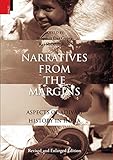Narratives from the margins : aspects of adivasi history in India
Material type: TextPublication details: Delhi Primus Books 2019Edition: 2Description: 319 pISBN: 9789352905270Subject(s): India | Indigenous peoples | Dalits--Political activity | Indigenous peoples--Politics and governmentDDC classification: 305.56880954 Summary: Adivasis have principally been studied in the context of rebellion, environmental history and the politics of identity. However, preoccupations with definitions and notions of identity, while important in themselves, tend to shift attention away from the inner lives of these communities. This book deals with different aspects of the histories of adivasi communities—from Rajasthan in the West to Bengal and Orissa in the east. The essays in this discusses a range of issues affecting socio-economic and cultural life of adivasis and explore the long term continuities and discontinuities between different political regimes. They also reflect some of the new concerns that have come up relating to methodology and sources, historiography and colonial concerns, the impact of missionaries, gender issues, The agrarian situation, famines and migration. Some of the issues addressed in this volume are the genesis and development of 'tribal studies in India during the colonial period; the quantization of adivasi groups and their assimilation within the Hindu caste fold as reflected in tulsidas ramcharitmanas; the work of the Protestant missions among the Santhals of Chotanagpur; the social and ritual relations between the Bhils and the Rajput ruling dynasties of dungarpur in southern Rajasthan; the aspect of agrarian change among the hos of singhbhum; the factors behind the migration from Chotanagpur, its nature and organization and its impact upon the adivasi village community; question of womens agency in colonial Chotanagpur; and an exploration of land rights, witchcraft, employment patterns and how women challenged patriarchy in their everyday lives; and the impact of globalisation and liberalization upon adivasi in contemporary India. The book will be of use to students and scholars of history, anthropology and sociology and also to policy-planners concerned with 'tribal issues.
TextPublication details: Delhi Primus Books 2019Edition: 2Description: 319 pISBN: 9789352905270Subject(s): India | Indigenous peoples | Dalits--Political activity | Indigenous peoples--Politics and governmentDDC classification: 305.56880954 Summary: Adivasis have principally been studied in the context of rebellion, environmental history and the politics of identity. However, preoccupations with definitions and notions of identity, while important in themselves, tend to shift attention away from the inner lives of these communities. This book deals with different aspects of the histories of adivasi communities—from Rajasthan in the West to Bengal and Orissa in the east. The essays in this discusses a range of issues affecting socio-economic and cultural life of adivasis and explore the long term continuities and discontinuities between different political regimes. They also reflect some of the new concerns that have come up relating to methodology and sources, historiography and colonial concerns, the impact of missionaries, gender issues, The agrarian situation, famines and migration. Some of the issues addressed in this volume are the genesis and development of 'tribal studies in India during the colonial period; the quantization of adivasi groups and their assimilation within the Hindu caste fold as reflected in tulsidas ramcharitmanas; the work of the Protestant missions among the Santhals of Chotanagpur; the social and ritual relations between the Bhils and the Rajput ruling dynasties of dungarpur in southern Rajasthan; the aspect of agrarian change among the hos of singhbhum; the factors behind the migration from Chotanagpur, its nature and organization and its impact upon the adivasi village community; question of womens agency in colonial Chotanagpur; and an exploration of land rights, witchcraft, employment patterns and how women challenged patriarchy in their everyday lives; and the impact of globalisation and liberalization upon adivasi in contemporary India. The book will be of use to students and scholars of history, anthropology and sociology and also to policy-planners concerned with 'tribal issues.
| Item type | Current library | Collection | Call number | Status | Date due | Barcode |
|---|---|---|---|---|---|---|
 BK
BK
|
Kannur University Central Library Stack | Stack | 305.56880954 NAR (Browse shelf (Opens below)) | Available | 59333 |
Adivasis have principally been studied in the context of rebellion, environmental history and the politics of identity. However, preoccupations with definitions and notions of identity, while important in themselves, tend to shift attention away from the inner lives of these communities. This book deals with different aspects of the histories of adivasi communities—from Rajasthan in the West to Bengal and Orissa in the east. The essays in this discusses a range of issues affecting socio-economic and cultural life of adivasis and explore the long term continuities and discontinuities between different political regimes. They also reflect some of the new concerns that have come up relating to methodology and sources, historiography and colonial concerns, the impact of missionaries, gender issues, The agrarian situation, famines and migration. Some of the issues addressed in this volume are the genesis and development of 'tribal studies in India during the colonial period; the quantization of adivasi groups and their assimilation within the Hindu caste fold as reflected in tulsidas ramcharitmanas; the work of the Protestant missions among the Santhals of Chotanagpur; the social and ritual relations between the Bhils and the Rajput ruling dynasties of dungarpur in southern Rajasthan; the aspect of agrarian change among the hos of singhbhum; the factors behind the migration from Chotanagpur, its nature and organization and its impact upon the adivasi village community; question of womens agency in colonial Chotanagpur; and an exploration of land rights, witchcraft, employment patterns and how women challenged patriarchy in their everyday lives; and the impact of globalisation and liberalization upon adivasi in contemporary India. The book will be of use to students and scholars of history, anthropology and sociology and also to policy-planners concerned with 'tribal issues.


There are no comments on this title.